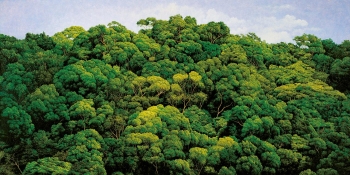

Lot 671
Yang-Ming Mountain in October
Tzu-chi YEH (Taiwanese, 1957)
2007-2008
Tempera and oil on linen
102 x 203 cm
Estimate
TWD 2,600,000-4,600,000
HKD 672,000-1,189,000
USD 87,000-153,000
Sold Price
TWD 7,200,000
HKD 1,865,285
USD 240,561
Signature
Tzu-chi Yeh: Landscape Taiwan, Eslite Gallery, Taipei, May 9 – June 7, 2009
ILLUSTRATED:
Landscape Taiwan, Eslite Gallery, Taipei, 2009, color illustrated, p. 11
+ OVERVIEW
CROSSING OVER MOUNTAINS AND RIVERS-APPRECIATING TZU-CHI YEH’S LANDSCAPES
In his youth, Tzu-chi Yeh often sang the theme song of a Hong Kong drama, “Demi-Gods and Semi-Devils”: “After the long and arduous journey, I fear not the strong wind and heavy rain. My pride swallows thunder and lightning, and drinks from the frosty, snowy cup.” At the time, he was at the forefront of Taiwan’s new art movement in the 1980s. However, after the artistic revolution had settled down, he decided to move on alone, to walk a path that belonged completely to him alone. Years later, from his still lifes “in soliloquy” to his landscapes reflecting “the mind,” Yeh called upon his sentiment and aesthetics to launch a lengthy dialogue with nature.
Born in Yuli, Hualien, hidden in the mountains of Taiwan, Yeh holds his own unique view of life. The mountains are an indelible and irreplaceable spiritual image engraved in his life, a natural map for the memories of his growth and development. Many people learn how to appreciate Taiwan’s mountains by seeing Yeh’s mountains. From “The Fringe of Taipei” and “Mountain in Hualien” he created decades ago to the later “Mt Shamao,” “Yang-Ming Mountain” and “The Fog in the Mountains” of Taroko, Yeh shows the hitherto unseen beauty and spirit of Taiwan’s mountains.
At the age of 15, Yeh left his home in the rift valley of Yuli for Hualien to attend high school. He had to rent a house and learn to take care of himself, experiencing for the first time the bitterness of being away from home. He traveled from the depths of the rift valley to the wide open Pacific, and not only did the ocean relieve his loneliness but also ignited his inner passion. The mystery of the ocean stimulated his curiosity toward life while the tall, steadfast mountains responded to his expectations for the known and the unknown as he grew up.
Yeh’s unique language in interpreting nature was gradually derived from the mountains, the ocean, the clouds, and the trees, creating a sort of “mind landscape” that is both realistic and metaphorical. We see the creative energy through his brushes passing over mountains and rivers, experiencing the fabled persistence and passion hidden in his works.
Written by Chang Chin-tsui
Assistant professor and acting director of Graduate Institute of the Indigenous Art, National Dong Hwa University
Modern & Contemporary Asian Art
Ravenel Spring Auction 2013 Taipei
Sunday, June 2, 2013, 2:30pm
